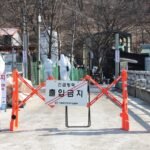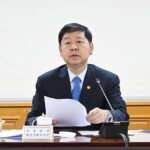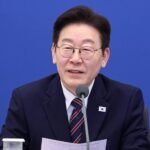SK Bioscience’s vaccine manufacturing facility (Courtesy of SK Bioscience)
South Korea’s vaccine developer SK Bioscience Co. will acquire a controlling stake in the world’s top 10 vaccine firm IDT Biologika GmbH in Germany for 339 billion won ($244 million) in hopes of doubling its sales in what would be the biggest investment by a Korean vaccine maker.
The Korean company announced in a regulatory filing on Thursday that its wholly-owned German operation SK Bioscience Germany GmbH will acquire a 60.6% stake in IDT Biologika from Klocke Holding GmbH for a total of 339 billion won in cash.
The deal includes the German vaccine manufacturer’s existing and new shares to be issued through a rights offering, as well as existing shares in another firm called Technik-Energie-Wasser Servicegesellschaft mbH, according to the filing.
IDT Biologika is a German vaccine manufacturer with a history of more than 100 years, which was merged into Klocke Group, a multinational pharmaceutical contract manufacturing and contract packaging firm headquartered in Germany, in 1993.
The German firm offers contract development and manufacturing organization (CDMO) services for vaccines, cell and gene therapies and biologics with manufacturing sites in Germany and the US.
The Korean vaccine maker expects to nearly double its sales after the deal, which is believed to be the biggest investment by a Korean vaccine maker, it said.
SK Bioscience shares jumped more than 10% on Thursday morning, welcoming the deal.
DEEPER PARTNERSHIP THROUGH CROSS INVESTMENT
Following SK Bioscience’s stake purchase, Klocke Group will hold a 40% stake in IDT Biologika, becoming the second biggest stakeholder after the Korean firm.
The German CMO group will also invest about 79 billion won in SK Bioscience to own a 1.9% stake.
Through their cross investment, the two companies will deepen their partnership in the CDMO sector while jointly operating and managing IDT Biologika, the Korean company said.
IDT Biologika boasts a strong track record of clinching long-term CDMO deals with multinational biotech and pharmaceutical companies from 15 countries, including Japan’s Takeda Pharmaceuticals.
SK Bioscience pins high hopes on the German company in speeding up the diversification of its portfolio by allowing it to venture into new sectors such as oncolytic virus treatment and cell and gene therapy (CGT).
SK Bioscience researchers at a vaccine lab (Courtesy of SK Bioscience)
The investment is also expected to allow SK Bioscience to obtain global-standard vaccine and biologics manufacturing capabilities meeting requirements in developed countries such as the US and Europe.
IDT Biologika’s facilities offer CMO services meeting Good Manufacturing Practice (GMP) and Biosafety Level 2 (BSL-2) requirements.
The Korean firm is also expected to broaden its customer base through the expansion of its global network connecting the US, Europe and Korea after the deal.
Early last year, SK Bioscience vowed to spend 2.4 trillion won ($1.8 billion) through 2027 and seek mergers and acquisitions to expand its business portfolio from contract manufacturing to gene therapy development.
The IDT stake deal is contrary to the latest moves by SK Bioscience’s sibling companies under SK Group’s scrutiny.
Korea’s second-largest conglomerate is carrying out aggressive corporate restructuring to streamline its organization with fewer affiliates to focus more on future growth engines.
This month, it announced a slew of sales of its assets across the board, including a plant of the group’s other CDMO company SK Pharmteco Co. in the US.
SK Inc. the group’s holding company, is said to be in final-stage talks to sell SK Pharmteco’s CDMO factory in Petersburg, Virginia to Novo Nordisk, according to sources on Tuesday.
By Young- Ae Lee
0ae@hankyung.com
Sookyung Seo edited this article.















